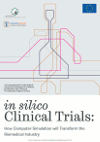 The term 'in silico clinical trials' refers to: "The use of individualised computer simulation in the development or regulatory evaluation of a medicinal product, medical device, or medical intervention." While computer simulation is widely used for the development and de-risking of a number of 'mission-critical' products such as civil aircraft, nuclear power plants, etc, biomedical product development and assessment is still predominantly founded on experimental rather than computer-simulated approaches. The need for long and complex experiments in vitro, on animals, and then on patients during clinical trials pushes development costs to unsustainable levels, stifling innovation, and driving the cost of healthcare provision to unprecedented levels.
The term 'in silico clinical trials' refers to: "The use of individualised computer simulation in the development or regulatory evaluation of a medicinal product, medical device, or medical intervention." While computer simulation is widely used for the development and de-risking of a number of 'mission-critical' products such as civil aircraft, nuclear power plants, etc, biomedical product development and assessment is still predominantly founded on experimental rather than computer-simulated approaches. The need for long and complex experiments in vitro, on animals, and then on patients during clinical trials pushes development costs to unsustainable levels, stifling innovation, and driving the cost of healthcare provision to unprecedented levels.
The Avicenna Action, funded by the European Commission, has engaged 525 experts from 35 countries, including 22 of the 28 members of the European Union, in an 18-month consensus process, to produce this research and technological development roadmap.
This document provides an overview of how biomedical products are developed today, where in silico clinical trials technologies are already used, and where else they could be used. From the identification of the barriers that prevent wider adoption, we derived a detailed list of research and technological challenges that require pre-competitive funding to be overcome.
Download: in silico Clinical Trials: How Computer Simulation will Transform the Biomedical Industry (.pdf, 5.500 KB).
Download from eHealthNews.eu: in silico Clinical Trials: How Computer Simulation will Transform the Biomedical Industry (.pdf, 5.500 KB).